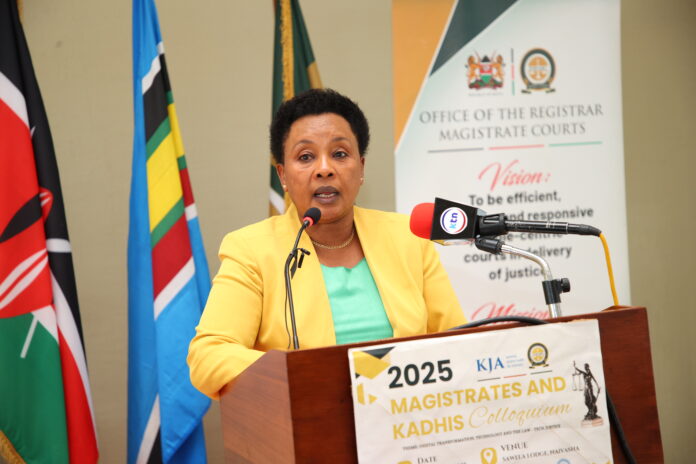Deputy Chief Justice (DCJ) Philomena Mwilu has called on judicial officers to remain steadfast in their commitment to fairness, independence, competence, and integrity in the administration of justice.
Addressing Magistrates and Kadhis, the DCJ reminded them of their oath of office, which demands impartiality and justice without fear, favour, bias, ill-will, or undue influence—whether political, religious, or otherwise.
Speaking at the close of the Magistrates’ and Kadhis’ Colloquium held in Naivasha, Justice Mwilu underscored the importance of upholding the principles enshrined in the judicial oath, emphasizing that these ideals must be observed with unwavering fidelity.
Aligned with the colloquium’s theme, “Digital Transformation, Technology and the Law – Tech Justice,” the DCJ highlighted the increasingly critical role of digitization in the Judiciary. She stressed the need for judicial officers to continuously update their skills and expand their knowledge in order to meet the demands of a rapidly evolving legal landscape.
“Our journey over the past six years clearly shows that digitization has brought significant advantages to the Judiciary,” she said. “However, these benefits come with new challenges that must be carefully addressed.”
Justice Mwilu pointed out several key concerns, including data privacy issues, the integrity of digital evidence, disparities in technology access, and the growing digital divide—often exacerbated by limited digital literacy and infrastructural barriers. She also flagged the inadequacy of current legal frameworks, many of which are outdated or ill-equipped to handle the fast pace of technological change.
Additional challenges noted included resistance to cultural change within the Judiciary, limited resources for training personnel, and emerging concerns surrounding virtual hearings and fair trial guarantees—particularly in relation to the management and admissibility of digital evidence.
Participants at the colloquium explored the legal implications of emerging technologies such as artificial intelligence, including ethical and human rights considerations, and the development of both local and global regulatory frameworks. Discussions also covered the Judiciary’s own experiences with automation and the existing legal structures governing data privacy and protection.
“I’m confident that this engagement has broadened your understanding of these dynamic and critical areas,” said the DCJ. “I urge each of you to keep learning and adapting—our future is digital, and we must be ready.”
Justice Mwilu also emphasized the need for efficient court management using available tools, with special mention of the Court Users Committees (CUCs). She referenced the recent introduction of the CUC Monitoring Reporting and Analysis System (MORAS), a digital platform for automating meeting records, as a step towards more streamlined court operations.
“A vibrant, active CUC is essential to ensuring that justice is delivered effectively and efficiently at every court station,” she stated.
Highlighting the progress made, the DCJ noted that between July and December 2024, Magistrates’ Courts across the country received 181,439 cases and successfully resolved 179,377—an impressive 99% clearance rate.
“This isn’t just a number—it reflects your hard work, dedication, and the resilience of our judicial teams,” she said.
However, she raised concerns over the increasing workload, with each magistrate handling an average of 1,332 cases, calling attention to the implications for well-being, efficiency, and long-term sustainability.
“You cannot pour from an empty cup. Your wellness matters,” she emphasized. “Despite the heavy demands of your role, I urge you to remain mindful of the immense responsibility you bear. As custodians of judicial authority, which represents the delegated sovereignty of the Kenyan people, you are called to serve with honor, diligence, and integrity.”



















